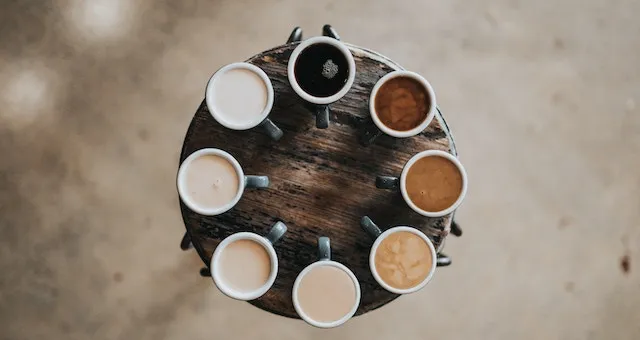
Wired: 9 of the Best Coffee Books for Buzzed Reading
This content contains affiliate links. When you buy through these links, we may earn an affiliate commission.
Ah, coffee and books: Two of humanity’s great loves. We loved coffee so much we named a table after it. We loved books so much we created a category of books just for that table. But today, we’re going to be mashing these two wonders of the world together and checking out some of the best coffee books. In other words, books about coffee.
Surprisingly, there aren’t as many books out there about our beloved caffeinated beverage as you might expect. Recently, I was at my local book superstore, and was able to find…zero. There were books about beer, wine, spirits, juices, smoothies, tea, kombucha. But not coffee. Not a single one. I knew that coffee books existed because I’d already read some, and would find more. But I found this lack of mainstream availability perplexing.
So what gives? My theory is that we (consumers of coffee who are detached from its origins) love coffee as a stimulant but find it difficult as a subject. After all, it’s esoteric and problematic. Coffee culture can intimidate. Coffee as a global industry evokes uncomfortable subjects like worker exploitation and climate change.
Of course, none of this means we shouldn’t try to drink better coffee, have a better understanding of it, and improve our relationship with it. So here are some books that can help with all that. Whether you’re looking for the best coffee books for baristas, the best books about espresso, or the best books on coffee in general, read on.
This first book might interest you if you’re not currently immersed in coffee culture but would like to learn the basics. Maybe you’ve already picked up books meant for coffee professionals, hoping against hope you wouldn’t be falling asleep after the first few pages, but to no avail.
The Home Barista walks you through the essentials of sourcing, roasting, and brewing your own coffee. If you’re looking for something accessible, affordable, and non-intimidating that still takes you up to the level of latte art, this may be for you. Be your own barista. Or apply for a job at your local coffee shop with more knowledge than the usual beginner.
Both a coffee table book and a coffee book, The Curious Barista’s Guide to Coffee is a more detailed how-to guide that’s still a lot of fun. Like The Home Barista, this read aims to cover the big picture of coffee from bean to cup, but with a bit of a fancier, more serious vibe. It goes into deeper detail about making espresso and other types of coffee, and introduces history alongside practical knowledge. Step-by-step instructions and accompanying photographs make it easy to visualize processes before you attempt them.
Let’s say that, despite all the challenges and ethical concerns you might face in the coffee industry (which the next section of books will cover in more detail), you want to get involved in it. Like, fully involved. How would you go about starting your own coffee shop? Well, to begin with, you would obviously want to make it a combination coffee shop and bookstore, right? In any case, Starting Your Own Coffee Shop by Jessica Simms can get you going.
Starting Your Own Coffee Shop goes over the basics of the coffee business, from what equipment you may want to consider buying, to drawing up a business plan, to marketing. It’s a pretty simple overview of the process. So it’s probably best for those in the early stages of planning a shop, or just starting to consider opening one. If you love the idea of being a coffee shop owner but aren’t sure what’s involved, this book gives you a low-pressure intro.
While some of the earlier books on this list talk about the ethics of coffee, most of the focus thus far has been on consumers and buyers of coffee. Brewing Justice takes a close look at coffee producers within a limited but significant context, zooming in on production in Oaxaca. Specifically, it explores the question of how fair trade practices fit into the global coffee industry.
In Brewing Justice, Jaffee attempts to explain what “fair trade” really means and why it’s such a complicated concept. In short, it’s not a magic wand to wave producers out of poverty. Brewing Justice looks at “fair trade” as both an ideal and a practice, and examines what it could mean for the future.
The Fair Trade Scandal expands on the subject of fair trade (which you definitely need more than one book to explore). Here, author Ndongo Sylla argues that the Fair Trade certification system is more about the commodification of social justice under capitalism than changing the actual structure that causes worker exploitation.
The Fair Trade Scandal also sheds light on how Fair Trade certification benefits workers in Latin American countries more than those in Africa or Asia.
So, obviously it’s tough to negotiate the truth of where the consumables we enjoy come from. How do we square the transcendent pleasure they bring with the fraught history and present behind them? This book may not provide the answer to this question, but it could be a start towards thinking about it.
In Bread, Wine, Chocolate, journalist Simran Sethi looks into the whole coffee process with more of a focus on the origins than the end product. She spends a substantial amount of time in Ethiopia, which is the birthplace of coffee and still a major coffee hub. Coffee only makes up one section of this book about internationally beloved products threatened by climate change and weakening biodiversity. Despite this, Bread, Wine, Chocolate performs a deep and thoughtful probe into the subject. It invites the reader to peer closely at a reality coffee consumers are often encouraged to look away from.
Sethi doesn’t try to separate the pleasure of coffee from morality. Instead, she examines how the two are intertwined. She also questions whether a willingness to develop more open-minded tastes could contribute to saving this unique and diverse beverage.
Need to take a step back? Earlier mentions of espresso and dairy designs still making your head spin? It’s okay. Let’s retreat to Level Zero. What we have here is a coffee book that’s not about espresso. Yes, you read that right. Just because you’re not into the whole coffee scene doesn’t mean you have to settle for instant.
Craft Coffee is simply about getting you the right gear, beans, and knowledge to make better non-froufrou brew. Whether you opt for pour-over, cold brew, or what-have-you. The book is entertainingly written, with punchy sensibilities. One choice heading reads, “Coffee Jargon, Motherf***er, Do You Speak It?”
Cold brew, as a coffee product, falls under its own designation. It doesn’t carry the classic snob appeal of espresso. But we associate it with hipsters and other people who drink out of jam jars for clout. (As opposed to when you just don’t have any clean glasses.) Cold brew is fashionable, but in a DIY way. What’s important, though, is that it can be really good. And it’s become well-known enough to deserve its own book.
Cold Brew Coffee is a cute guide with charming illustrations that explains what cold brew is and gets you set up making your own. It includes cocktail ideas that should prove to be eminently Instagrammable. Confession: What drew me to this book was the mention of a cold brew Negroni. Yes, please!
This book grew out of coffee fan Ryoko Iwata’s website I Love Coffee, an infographic-heavy blog that celebrates the beverage with humor and unbridled joy. It details factual information about coffee in a fun way, taking you on a wild ride through the author’s own caffeine buzz. Coffee may be complicated. But that doesn’t mean that we can’t just enjoy it sometimes.
Coffee certainly is a complex subject. But that’s all the more reason to give it the time and thought it deserves. With the books above, you can become a better barista, a more conscious consumer, and someone who simply has a richer appreciation of one of the most interesting drinks in the history of the world.
The Best Coffee Books for Current and Aspiring Baristas
 The Home Barista: How to Bring Out the Best in Every Coffee Bean by Simone Egger and Ruby Ashby Orr
The Home Barista: How to Bring Out the Best in Every Coffee Bean by Simone Egger and Ruby Ashby Orr
This first book might interest you if you’re not currently immersed in coffee culture but would like to learn the basics. Maybe you’ve already picked up books meant for coffee professionals, hoping against hope you wouldn’t be falling asleep after the first few pages, but to no avail.
The Home Barista walks you through the essentials of sourcing, roasting, and brewing your own coffee. If you’re looking for something accessible, affordable, and non-intimidating that still takes you up to the level of latte art, this may be for you. Be your own barista. Or apply for a job at your local coffee shop with more knowledge than the usual beginner.
 The Curious Barista’s Guide to Coffee by Tristan Stephenson
The Curious Barista’s Guide to Coffee by Tristan Stephenson
Both a coffee table book and a coffee book, The Curious Barista’s Guide to Coffee is a more detailed how-to guide that’s still a lot of fun. Like The Home Barista, this read aims to cover the big picture of coffee from bean to cup, but with a bit of a fancier, more serious vibe. It goes into deeper detail about making espresso and other types of coffee, and introduces history alongside practical knowledge. Step-by-step instructions and accompanying photographs make it easy to visualize processes before you attempt them.
 Starting Your Own Coffee Shop by Jessica Simms
Starting Your Own Coffee Shop by Jessica Simms
Let’s say that, despite all the challenges and ethical concerns you might face in the coffee industry (which the next section of books will cover in more detail), you want to get involved in it. Like, fully involved. How would you go about starting your own coffee shop? Well, to begin with, you would obviously want to make it a combination coffee shop and bookstore, right? In any case, Starting Your Own Coffee Shop by Jessica Simms can get you going.
Starting Your Own Coffee Shop goes over the basics of the coffee business, from what equipment you may want to consider buying, to drawing up a business plan, to marketing. It’s a pretty simple overview of the process. So it’s probably best for those in the early stages of planning a shop, or just starting to consider opening one. If you love the idea of being a coffee shop owner but aren’t sure what’s involved, this book gives you a low-pressure intro.
The Best Books About Coffee Ethics
 Brewing Justice by Daniel Jaffee
Brewing Justice by Daniel Jaffee
While some of the earlier books on this list talk about the ethics of coffee, most of the focus thus far has been on consumers and buyers of coffee. Brewing Justice takes a close look at coffee producers within a limited but significant context, zooming in on production in Oaxaca. Specifically, it explores the question of how fair trade practices fit into the global coffee industry.
In Brewing Justice, Jaffee attempts to explain what “fair trade” really means and why it’s such a complicated concept. In short, it’s not a magic wand to wave producers out of poverty. Brewing Justice looks at “fair trade” as both an ideal and a practice, and examines what it could mean for the future.
 The Fair Trade Scandal: Marketing Poverty to Benefit the Rich by Ndongo Sylla
The Fair Trade Scandal: Marketing Poverty to Benefit the Rich by Ndongo Sylla
The Fair Trade Scandal expands on the subject of fair trade (which you definitely need more than one book to explore). Here, author Ndongo Sylla argues that the Fair Trade certification system is more about the commodification of social justice under capitalism than changing the actual structure that causes worker exploitation.
The Fair Trade Scandal also sheds light on how Fair Trade certification benefits workers in Latin American countries more than those in Africa or Asia.
 Bread, Wine, Chocolate: The Slow Loss of Foods We Love by Simran Sethi
Bread, Wine, Chocolate: The Slow Loss of Foods We Love by Simran Sethi
So, obviously it’s tough to negotiate the truth of where the consumables we enjoy come from. How do we square the transcendent pleasure they bring with the fraught history and present behind them? This book may not provide the answer to this question, but it could be a start towards thinking about it.
In Bread, Wine, Chocolate, journalist Simran Sethi looks into the whole coffee process with more of a focus on the origins than the end product. She spends a substantial amount of time in Ethiopia, which is the birthplace of coffee and still a major coffee hub. Coffee only makes up one section of this book about internationally beloved products threatened by climate change and weakening biodiversity. Despite this, Bread, Wine, Chocolate performs a deep and thoughtful probe into the subject. It invites the reader to peer closely at a reality coffee consumers are often encouraged to look away from.
Sethi doesn’t try to separate the pleasure of coffee from morality. Instead, she examines how the two are intertwined. She also questions whether a willingness to develop more open-minded tastes could contribute to saving this unique and diverse beverage.
Just for Fun: the Best Casual Coffee Books
 Craft Coffee: A Manual by Jessica Easto and Andreas Willhoff
Craft Coffee: A Manual by Jessica Easto and Andreas Willhoff
Need to take a step back? Earlier mentions of espresso and dairy designs still making your head spin? It’s okay. Let’s retreat to Level Zero. What we have here is a coffee book that’s not about espresso. Yes, you read that right. Just because you’re not into the whole coffee scene doesn’t mean you have to settle for instant.
Craft Coffee is simply about getting you the right gear, beans, and knowledge to make better non-froufrou brew. Whether you opt for pour-over, cold brew, or what-have-you. The book is entertainingly written, with punchy sensibilities. One choice heading reads, “Coffee Jargon, Motherf***er, Do You Speak It?”
 Cold Brew Coffee by Chloë Callow
Cold Brew Coffee by Chloë Callow
Cold brew, as a coffee product, falls under its own designation. It doesn’t carry the classic snob appeal of espresso. But we associate it with hipsters and other people who drink out of jam jars for clout. (As opposed to when you just don’t have any clean glasses.) Cold brew is fashionable, but in a DIY way. What’s important, though, is that it can be really good. And it’s become well-known enough to deserve its own book.
Cold Brew Coffee is a cute guide with charming illustrations that explains what cold brew is and gets you set up making your own. It includes cocktail ideas that should prove to be eminently Instagrammable. Confession: What drew me to this book was the mention of a cold brew Negroni. Yes, please!
 Coffee Gives Me Superpowers: An Illustrated Book About the Most Awesome Beverage on Earth by Ryoko Iwata
Coffee Gives Me Superpowers: An Illustrated Book About the Most Awesome Beverage on Earth by Ryoko Iwata
This book grew out of coffee fan Ryoko Iwata’s website I Love Coffee, an infographic-heavy blog that celebrates the beverage with humor and unbridled joy. It details factual information about coffee in a fun way, taking you on a wild ride through the author’s own caffeine buzz. Coffee may be complicated. But that doesn’t mean that we can’t just enjoy it sometimes.
Coffee certainly is a complex subject. But that’s all the more reason to give it the time and thought it deserves. With the books above, you can become a better barista, a more conscious consumer, and someone who simply has a richer appreciation of one of the most interesting drinks in the history of the world.



 The Home Barista: How to Bring Out the Best in Every Coffee Bean
The Home Barista: How to Bring Out the Best in Every Coffee Bean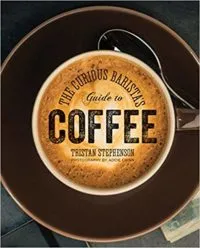 The Curious Barista’s Guide to Coffee
The Curious Barista’s Guide to Coffee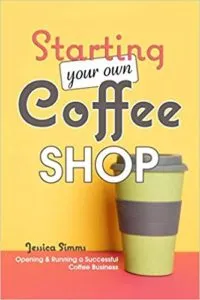 Starting Your Own Coffee Shop
Starting Your Own Coffee Shop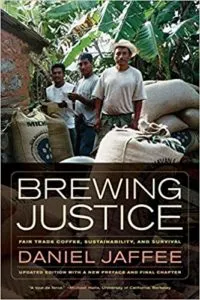 Brewing Justice
Brewing Justice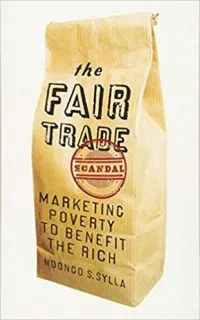 The Fair Trade Scandal: Marketing Poverty to Benefit the Rich
The Fair Trade Scandal: Marketing Poverty to Benefit the Rich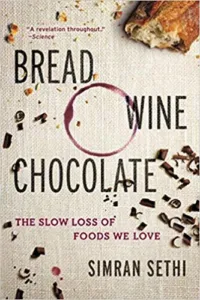 Bread, Wine, Chocolate: The Slow Loss of Foods We Love
Bread, Wine, Chocolate: The Slow Loss of Foods We Love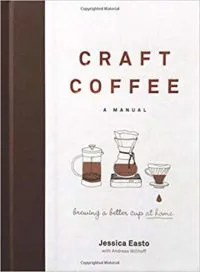 Craft Coffee: A Manual
Craft Coffee: A Manual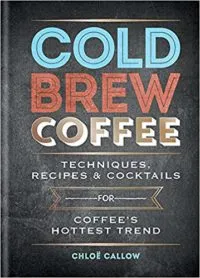 Cold Brew Coffee
Cold Brew Coffee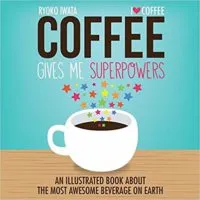 Coffee Gives Me Superpowers: An Illustrated Book About the Most Awesome Beverage on Earth
Coffee Gives Me Superpowers: An Illustrated Book About the Most Awesome Beverage on Earth







